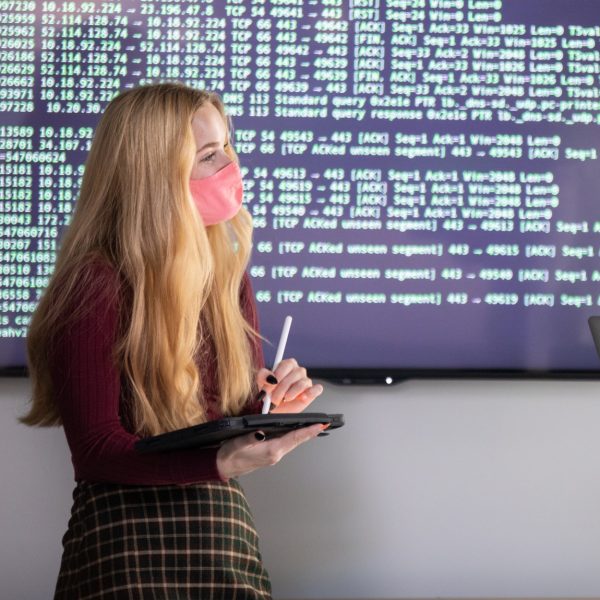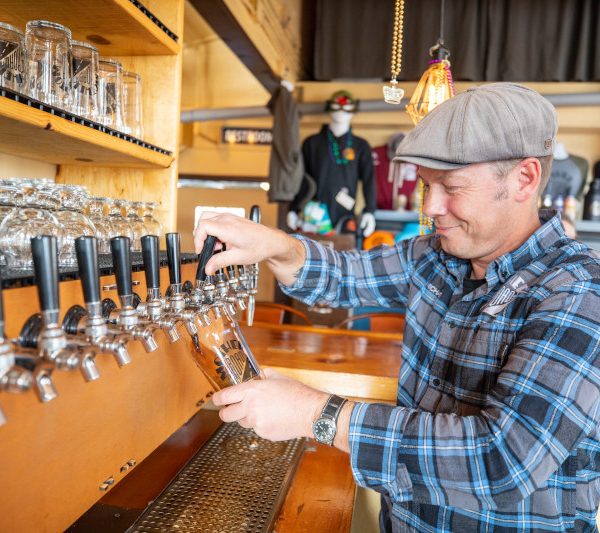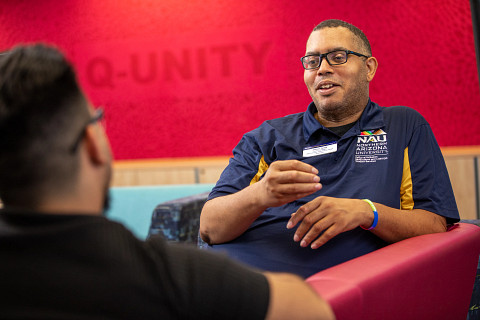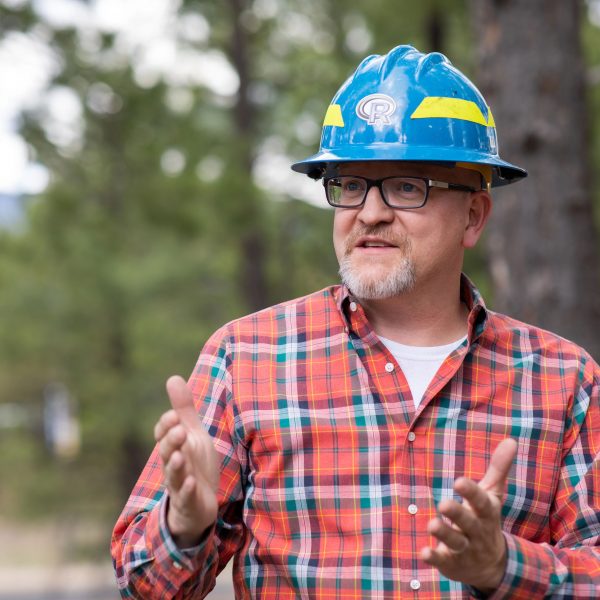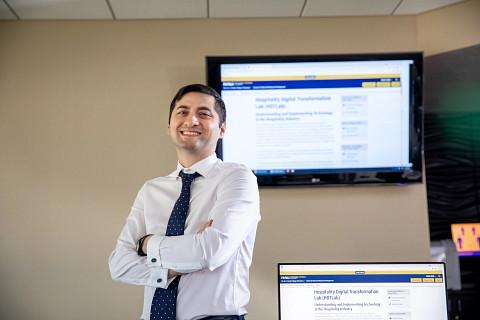
NAU professor Dr. Muhittin Cavusoglu helps his hospitality students connect the dots between collaboration, new technology, and multiculturalism.
Muhittin Cavusoglu, known to his students as “Dr. Tim,” is committed to preparing NAU’s undergraduates for success in the hospitality industry. An assistant professor of Hospitality Information Technology in the School of Hotel and Restaurant Management, Cavusoglu began teaching at NAU in the fall of 2020 following a faculty position at the University of South Florida Sarasota-Manatee (USF).
“When I visited NAU for the first time, I received this big, warm welcome,” Cavusoglu said. He appreciated the exciting possibilities the flagship program presented. “Being here is a great opportunity to work with colleagues and students with a diverse background.”
Cavusoglu has embraced new opportunities in the form of innovative research, the exploration of novel technology, and the unique approach he takes to engage with his students.
“Every week, I start with hospitality industry updates in the classroom. I’ll say, ‘okay, these things are happening in the industry; we’ll discuss them today.’ I start the day like this.” Cavusoglu will share industry news from hospitality technology magazines and peer-reviewed journals directly from his phone through the classroom projector.
This deceptively casual teaching tool is deliberately designed with self-directed learning in mind, something familiar to Cavusoglu through previous research. “It’s one way of getting the students’ attention,” he said, commenting that he often observes self-directed learning in industry professionals, as they already see the research or skills in classroom discussion being applied to real-world situations. “They see the reason why they need to learn more to get promoted, to increase salaries. And here, it’s all in the air. We talk about robotics technology. Come on; I don’t have a robot at my workplace. Yes, but how about tomorrow? You never know.”
‘No’ is a word banned in hospitality, which makes it more exciting. ‘How can I think outside the box?’ You must evaluate all these different things—finance, accounting, marketing, and technology—so you learn broadly.
Another concept stressed to his students is the hospitality industry’s necessity for agile creativity.
“‘No’ is a word banned in hospitality, which makes it more exciting. ‘How can I think outside the box?’ You must evaluate all these different things—finance, accounting, marketing, and technology—so you learn broadly.”
This sentiment has been echoed by the global and local hospitality leaders Cavusoglu introduces to his students in the classroom.
During a recent webinar with a past president of Hospitality Financial and Technology Professionals, “I asked, ‘what kind of employee are you seeking to hire in the next five years?’ He said, ‘Very forward-thinking. We want multiskilled, adaptable students.’ Which means they need to know everything—technology, marketing, finance, kitchen, training, a lot of cross-training.”
Diversity in hospitality
Flexibility and open-minded thinking are also emphasized in other ways.
“Hospitality has, I think, the most diverse industry out there, and learning about intercultural communication is a big thing,” said Cavusoglu. “I try to bring all these differences into the classroom because hospitality is all about diversity; all different countries, different people.” Cultural differences are present in everything from body language to rideshare apps, he explained. “Intercultural communication is essential. That’s why learning, hearing from different countries, I believe it helps a lot of students improve their perspective, looking at the people from different parts of the world.”
Thanks to his early hospitality training in his native Turkey and his current tenure as the International Director for Conferences and Events for the Association of North America Higher Education International, Cavusoglu is intimately familiar with diversity’s key role in his chosen industry.
Alongside critical industry cornerstones like multiculturalism, flexibility, and collaboration, Cavusoglu stresses the importance of advances in hospitality-related technology to his students and explores it further through his research in NAU’s new Hospitality Digital Transformation Lab (HDTLab). The lab’s goal is to provide a space for collaboration between researchers, undergraduate and graduate students, and industry leaders, and in doing so, find new ways to inject technology into the art and science of hospitality.
“We’re trying to make this lab not just for testing purposes, but also an area where, when we have research scholars, we can meet, do brainstorming, and come up with new projects.”
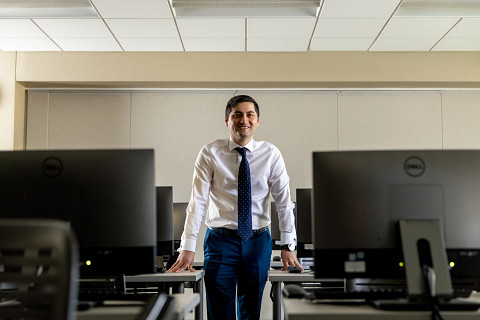
Some of the technology is unsurprisingly aimed at enhancing comfort, convenience, and the customer experience, such as improved keyless technology in hotels. Other new tools are utilized by restaurant and hotel owners to hone their approach and craft a more effective business. One of these innovations in use today is eye-tracking software.
“Whenever you’re looking at a menu, the software checks your eyes and creates a heat map, monitoring how many seconds it takes to reach a certain product and where you’re looking at. So, this brings a better design of the menu items, websites, and many other products.”
Jasmin Zuniga, a former student of Cavusoglu’s, is excited by new technology and believes there’s a lot of room for innovation, especially for younger professionals.
“I really liked how Dr. Tim gave us examples of how different aspects of technology are improving in hospitality. It was just very interesting to me, and no other classes taught me the advancements that the hospitality industry is making in technology. He opened my eyes to technology use,” Zuniga said. “Technology is really important nowadays, especially with COVID. A lot of people weren’t comfortable checking in at the front desk, or with human contact in general and prefer doing things on their phones. With this newer generation, we’re all used to phones, computers, iPads, using barcodes, QR codes, to go ahead and scan whatever. I think to younger generations it’s really exciting to see the improvements technology is making in hospitality.”
The foundations of hospitality, old and new, have not only captured Cavusoglu’s enthusiasm but have also allowed him to fulfill his lifelong dreams. “It was always my motto: visit more, learn more, know more,” he said of his days as a student. “Another dream was becoming a teacher. I’ve merged these two goals and am living the dream career.”



